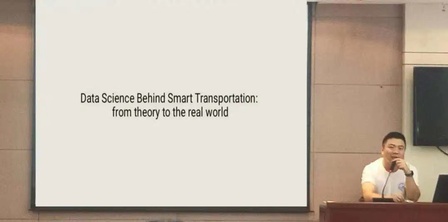The special lecture on “Data Science Behind Smart Transportation: from theory to the real world” was successfully held
Publish date:2023-10-09click:62
On the afternoon of September 27th, an institute-level lecture sponsored by the College of Transportation Engineering and co-organized by the Graduate Student Scientific and Technological Association of the institute was successfully held in the first conference room of the Academic Exchange Center at the South Campus, Chang’an University. The lecture featured Dr. Jiangshan Ma, the Director of Algorithms at Ctrip Group, who delivered a presentation titled Data Science Behind Smart Transportation: from theory to the real world. More than 50 faculty members and students from the college attended this lecture.
The presentation by Dr. Jiangshan Ma covered six main topics: Transportation Products, Bus Operation, Carpool, Trip Recommendations, Data Analysis, and Causal Inference.

Site
Dr. Ma began by distinguishing transportation products into three categories: policy oriented products, implementation oriented products, and visualization oriented products. Policy oriented products share the commonality of model stacking, while implementation oriented products mostly revolve around signal control, characterized by standardization and a notable input-output ratio. Visualization oriented products include concepts like digital twins. Dr. Ma highlighted the challenges currently faced in these three different types of products, including the issue of bias amplification when models are stacked, and the lack of offline benchmarks to evaluate different models, which is a direction for future product improvements. After Dr. Ma's presentation, students gained a more comprehensive understanding of the classification and existing challenges in transportation products, providing valuable guidance for their future studies and research.
Dr. Ma also shared insights from his own work experience in bus operations. He emphasized that the core of on-demand transit lies in reservations, as aggregating demand can be achieved through advance bookings. Given the relatively stable travel demand, conditions for aggregation exist. Once demand aggregation is accomplished, algorithms are employed to plan routes, followed by production implementation to make the service operational.
Dr. Ma stressed the difference between theoretical and practical applications of data science, advising students to be mindful of the distinction between textbook theory and real-world application when conducting scientific research. He encouraged the application of acquired knowledge in practical settings. Additionally, he encouraged students to adopt a dialectical perspective, cultivate independent thinking, and develop their own thoughts and opinions on various matters.
Following the conclusion of the lecture, students proposed many questions about the practical application of data science, and Dr. Ma patiently answered their inquiries, providing a more comprehensive and detailed understanding of the differences between theoretical and practical aspects of data science. This interaction left students with new insights and a deeper understanding of scientific research.
Copyright©2020 by College of Transportation Engineering | Technical Support: Xi'an Zerui Communication Co. Ltd.